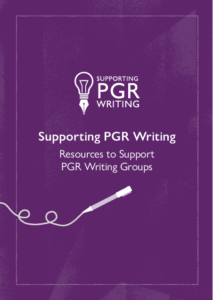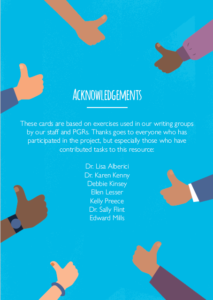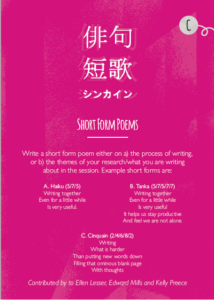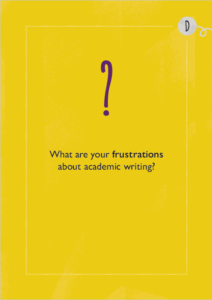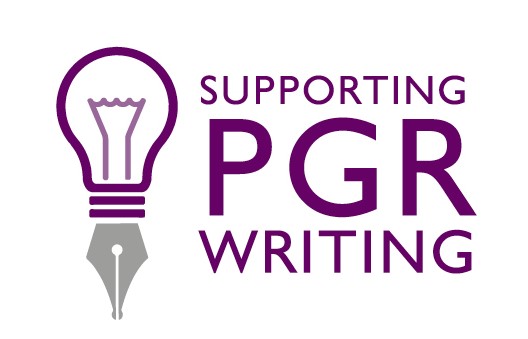Kelly Louise Preece is the Researcher Development Manager for PGRs in the Doctoral College. You’ll recognise her face from workshops, her voice from WEBINARs, and her jokes from the 90s. You can follow her on twitter @Preece_Kelly for musings about Researcher Development and the PGR experience…interspersed with tweets about superheros, sewing and cute cat photos.
As some of you will know, in 2018 I received a grant from the University of Exeter Alumni Annual Fund to develop practice, training and resources to support PGR writing. As we come to the end of the second year of the project, I want to provide an update on the project, what we have achieved so far and introduce a brand new resource we have developed to support running PGR writing groups.
I also want to take this opportunity to reflect on the impact our writing groups have been having during the Covid-19 pandemic on our PGRs productivity, wellbeing and often sanity. Our PGR facilitators well and truly stepped up during lockdown, enabling the Doctoral College to run at least one online writing group a day throughout the pandemic. I am writing this blog post as I co-facilitate an online writing retreat with PGR Sam Jones. We have 22 PGRs joining us for the day to shut up and write, interspersed with discussions of writing, coffee, cake, and this afternoon a little bit of dinosaur origami (seriously).
But back to the task at hand – an update on the project. The original objectives of the project were as follows.
- To develop a structured approach to offering writing groups to our PGRs
During the early stages of the Supporting PGR Writing project in 2017, (BF – before funding) I worked with academic and poet Dr. Sally Flint to develop and articulate a writing group format that was unique to Exeter. Although our work draws significantly on the practices of Rowena Murray and our colleagues Sarah Dyer and Siobhan O’Dwyer, Sally and I brought our own experiences as creative practitioners in the format of our writing groups, making creative writing tasks the cornerstone of our approach. These warm-up creative writing tasks supplement the discussion breaks advocated by Murray, foster a sense of community by working on the same tasks, and providing space of PGRs to explore constructing narratives. During the first year of the project, we articulated and published this format in the Resources to Support PGR Writing Groups handbook.
- To train and empower our PGRs and ECRs to set-up and run local writing groups
The proliferation of (at least once) daily online writing groups and peer support for writing during Covid-19 is evidence of the network PGR facilitators we have developed, and the professional generosity and sense of community of our PGRs. The evolution of the project has seen a desire to keep writing groups a central, interdisciplinary form of support – it is the shared experience and sense of community that our PGRs value in these spaces, rather than a shared discipline.
To give some facts and figures:
- As of 29/5/2020, 16 PGRs have delivered 149 writing groups for us, in person and online
- During the 2017/2018 academic year, we ran 15 writing groups with a total of 79 attendees.
- With the project funding in 2018/2019, we ran 55 writing groups with a total of 398 attendances
- So far in the 2019/2020 academic year (up to 29/5/2020), we have run 96 writing groups with a total of 648 attendances, and we have c.100 more groups in plan throughout June, July and August.
- To create a network of training and support for facilitators, and develop expertise and practice at the university
Our training and support for facilitators has taken a number of formats, including:
- Online and face-to-face training sessions
- Providing observations and references for LTHE Stage 2 and Aspire/HEA Associate Fellowship
- Developing guidance on using writing group facilitation as an case study in applications for Aspire/HEA Associate Fellowship
- Promoting networking, discussion and practice sharing by email, SharePoint and twitter
- Developing supporting resources
The first year of the project has a resource output in the form of the Resources to Support PGR Writing Groups handbook, and we are delighted to launch the output for the second year of the project – the Supporting PGR Writing cards.
This online and hard copy deck of A6 cards collects the creative writing exercises and discussion tasks facilitators have used in writing groups throughout the project. Inspired by Sarah Dyer’s Appreciate: Cards to support appreciative partnership learning, this crowd-sourced resource supplements the handbook and shares the practice of our writing community. You can download this new resource for running PGR writing groups, as well as a version for academic writers more generally. We will be continuing to add to them as the project continues – in fact, as of today’s writing retreat we already have a creative writing task to add courtesy of Sam.
- To create a culture in the PGR community that values writing time, shares writing experiences and creates a peer-led community of practice
The current crisis, and our PGRs response to it, has evidenced the culture in the PGR community where writing, and peer-led communities of practice are valued. Alongside our online writing groups, we have had Humanities PGRs running virtual offices and PGR Debbie Kinsey have been running daily workalongs using Twitch (I still don’t really know what Twitch is, but the twitter feedback on these workalongs has been fantastic as have the Lego scenes Debbie has create to accompany them, so I am all for it). Whilst the project in no way takes credit for these initiatives, they are fantastic examples of how our PGRs are leading the way.
- And finally to impact on the productivity and wellbeing of our PGRs
To evidence our progress on arguably our most important objective, I hand you over to our PGR attendees.
To end, I just want to reiterate the acknowledgements in the resource by thanking all those involved in the development and delivery of the project so far. It is our PGRs and our research community than continues to make this project such a success.


